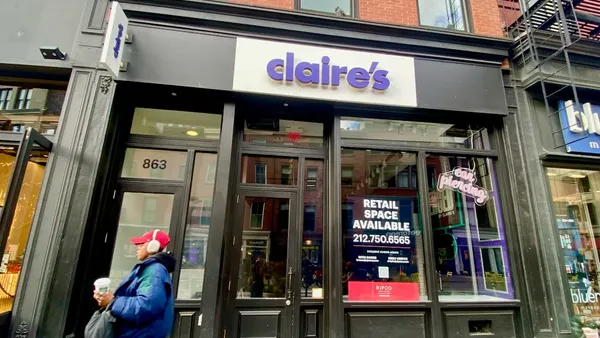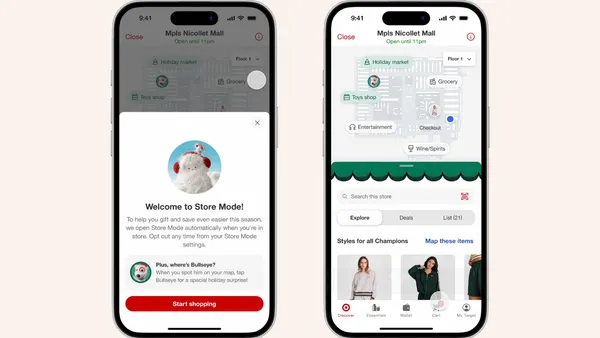Dive Brief:
- Chinese e-commerce and superstore operator Alibaba is setting the global pace for technological innovation in brick-and-mortar retailing in its 65 new Hema stores, according to CNBC.
- Mobile is at the heart of most of the customer-facing digital tech, called “New Retail” by Alibaba. Shoppers use Hema's app in-store to get information and recipe ideas, and scan barcodes, CNBC reported. Orders for customers within three kilometers (1.86 miles) of a store usually are delivered in 30 minutes. Customers pay using mobile payment system Alipay, from Alibaba affiliate company Ant Financial Services, which is integrated into the company's Taobao e-commerce platform. Some stores have face-recognition technology that allows shoppers to pay by scanning their faces at a kiosk.
- Conveyors run overhead throughout the store where employees place bags they have filled with online orders for transport to the delivery center, per CNBC. Adjacent to one Shanghai store, a restaurant called “Robot.He” recently opened. Customers can use the Hema app on their mobile devices to scan a QR code which accesses a menu, and then place an order which is served by robotic devices — large bowls of soup still require human servers.
Dive Insight:
Alibaba may not compete directly with U.S. companies, but it is a retail technology leader in many ways that domestic retailers will soon have to deal with. As an online company at its core, Alibaba's potential reach is global, and Alibaba delivers more packages than Amazon — 12 million a day versus 3 million a day respectively — according to Early Moves.
Alibaba began as an e-commerce company but is now aggressively expanding with brick-and-mortar stores in China. Alibaba recently partnered with Guess to pilot a temporary "FashionAI" concept store in Hong Kong integrating e-commerce with a physical store, and incorporating some of the most advanced technology yet to be tried by a retailer.
While U.S. retailers are just starting to integrate payments into their mobile apps, Alibaba's Alipay is well-established in China where it began in 2004, according to Coresight Research. It has the largest market share for mobile payment systems in China and already is in the U.S. While Alibaba said Alipay is in the U.S. for Chinese tourists, it has formed partnerships with First Data, J.P. Morgan Chase and North American Bancard, among others, in an effort to get Alipay accepted by as many U.S. merchants as possible.
Alibaba has installed many in-store technologies that U.S. retailers are still testing, such as promoting the use of the Hema app by shoppers in stores, and using robotics and conveyors to speed the picking of online orders in the stores. Some U.S. supermarkets like Wegmans, Niemann Foods and Whole Foods have opened restaurants next to stores, but at Alibaba's Robot.He restaurant in Shanghai, the menu and ordering are by mobile app, and the servers are mostly robots.
The company is also putting a big push behind cutting-edge payment technologies, including facial recognition, lately. It also led a financing round of $600 million for Sense-Time, an artificial intelligence startup that specializes in facial recognition and real-time surveillance. Alibaba also has partnered with KFC to enable the fast-food chain's customers to literally pay by smiling.












